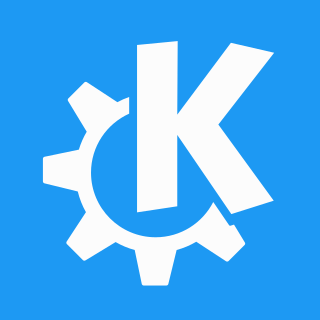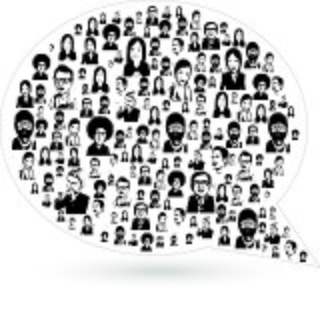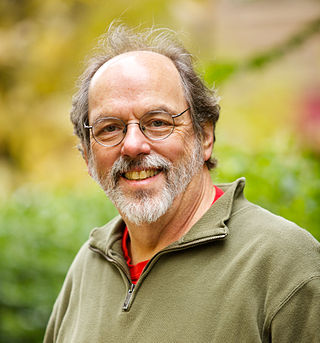
KDE is an international free software community that develops free and open-source software. As a central development hub, it provides tools and resources that enable collaborative work on its projects. Well-known products include the Plasma Desktop, KDE Frameworks, and a range of applications such as Kate, digiKam, and Krita. Some KDE applications are cross-platform and can run on Unix and Unix-like operating systems, Microsoft Windows, and Android.

A wiki is a form of hypertext publication on the internet which is collaboratively edited and managed by its audience directly through a web browser. A typical wiki contains multiple pages that can either be edited by the public or limited to use within an organization for maintaining its internal knowledge base.

GNOME Evolution is the official personal information manager for GNOME. It has been an official part of GNOME since Evolution 2.0 was included with the GNOME 2.8 release in September 2004. It combines e-mail, address book, calendar, task list and note-taking features. Its user interface and functionality is similar to Microsoft Outlook. Evolution is free software licensed under the terms of the GNU Lesser General Public License (LGPL).

daviswiki.org is a wiki based in Davis, California about the people, events, universities, bands, places and other things of the city. For example, it includes information about local events, advice for classes to take or not take at UC Davis, locations of the cleanest bathrooms in town, and ways a poor student can best pack a to-go box from the local restaurant buffets. Newcomers or anyone with a question about life in Davis are often asked by "wikivangelists", "Did you check the wiki?", much in the spirit of RTFM. It was launched in June 2004.

OpenStreetMap is a free, open geographic database updated and maintained by a community of volunteers via open collaboration. Contributors collect data from surveys, trace from aerial imagery and also import from other freely licensed geodata sources. OpenStreetMap is freely licensed under the Open Database License and as a result commonly used to make electronic maps, inform turn-by-turn navigation, assist in humanitarian aid and data visualisation. OpenStreetMap uses its own topology to store geographical features which can then be exported into other GIS file formats. The OpenStreetMap website itself is an online map, geodata search engine and editor.

Crowdsourcing involves a large group of dispersed participants contributing or producing goods or services—including ideas, votes, micro-tasks, and finances—for payment or as volunteers. Contemporary crowdsourcing often involves digital platforms to attract and divide work between participants to achieve a cumulative result. Crowdsourcing is not limited to online activity, however, and there are various historical examples of crowdsourcing. The word crowdsourcing is a portmanteau of "crowd" and "outsourcing". In contrast to outsourcing, crowdsourcing usually involves less specific and more public groups of participants.
Wikimapia is a geographic online encyclopedia project. The project implements an interactive "clickable" web map that utilizes Google Maps with a geographically-referenced wiki system, with the aim to mark and describe all geographical objects in the world.

The history of wikis began in 1994, when Ward Cunningham gave the name "WikiWikiWeb" to the knowledge base, which ran on his company's website at c2.com, and the wiki software that powered it. The wiki went public in March 1995, the date used in anniversary celebrations of the wiki's origins. c2.com is thus the first true wiki, or a website with pages and links that can be easily edited via the browser, with a reliable version history for each page. He chose "WikiWikiWeb" as the name based on his memories of the "Wiki Wiki Shuttle" at Honolulu International Airport, and because "wiki" is the Hawaiian word for "quick".

The Wikimedia Foundation, Inc., abbreviated WMF, is an American 501(c)(3) nonprofit organization headquartered in San Francisco, California, and registered there as a charitable foundation. It is the host of Wikipedia, the seventh most visited website in the world. It also hosts fourteen similar projects and supports the development of MediaWiki, the wiki software that underpins them all. The Foundation was established in 2003 in St. Petersburg, Florida by Jimmy Wales, as a non-profit way to fund his crowdsourced wiki projects. They had previously been hosted by Bomis, Wales's for-profit company.

Smári McCarthy is an Icelandic-Irish politician, innovator and information activist known for his work relating to direct democracy, transparency and privacy.

WikiTrust was a software product, available as a Firefox Plugin, which aimed to assist editors in detecting vandalism and dubious edits by highlighting the "untrustworthy" text with a yellow or orange background. As of September 2017, the server is offline, but the code is still available for download.
Waze Mobile Ltd, doing business as Waze, formerly FreeMap Israel, is a subsidiary company of Google that provides satellite navigation software on smartphones and other computers that support the Global Positioning System (GPS). In addition to turn-by-turn navigation, it incorporates user-submitted travel times and route details while downloading location-dependent information over a cellular network. Waze describes its application as a community-driven initiative that is free to download and use.
California Watch, part of the nonprofit Center for Investigative Reporting, began producing stories in 2009. The official launch of the California Watch website took place in January 2010. The team was best known for producing well researched and widely distributed investigative stories on topics of interest to Californians. In small ways, the newsroom pioneered in the digital space, including listing the names of editors and copy editors at the bottom of each story, custom-editing stories for multiple partners, developing unique methods to engage with audiences and distributing the same essential investigative stories to newsrooms across the state. It worked with many news outlets, including newspapers throughout the state, all of the ABC television affiliates in California, KQED radio and television and dozens of websites. The Center for Investigative Reporting created California Watch with $3.5 million in seed funding. The team won several industry awards for its public interest reporting, including the George Polk Award in 2012. In addition to numerous awards won for its investigative reports, the California Watch website also won an Online Journalism Award in the general excellence category from the Online News Association in its first year of existence.

LibreOffice is a free and open-source office productivity software suite, a project of The Document Foundation (TDF). It was forked in 2010 from OpenOffice.org, an open-sourced version of the earlier StarOffice. It consists of programs for word processing; creating and editing spreadsheets, slideshows, diagrams, and drawings; working with databases; and composing mathematical formulae. It is available in 120 languages. TDF does not provide support for LibreOffice, but enterprise-focused editions are available from companies in the ecosystem.

Daily Voice, formerly Main Street Connect, is an American community journalism company that says it "bridge[s] the 'news desert' between national and hyper-local, covering town, city, county, and state". It is based in Norwalk, Connecticut, and it operates town-based news websites in various places in New Jersey and in Fairfield County, Connecticut.
Government crowdsourcing is a form of crowdsourcing employed by governments to better leverage their constituents' collective knowledge and experience. It has tended to take the form of public feedback, project development, or petitions in the past, but has grown to include public drafting of bills and constitutions, among other things. This form of public involvement in the governing process differs from older systems of popular action, from town halls to referendums, in that it is primarily conducted online or through a similar IT medium.

The KDE Gear is a set of applications and supporting libraries that are developed by the KDE community, primarily used on Linux-based operating systems but mostly multiplatform, and released on a common release schedule.
The Omni Commons is a group of nine collectives in San Francisco's Bay Area devoted to DIY and community education. It traces its inception to the Occupy movement, specifically Occupy Oakland, and was founded in 2014 on the principles of "community, positive creation and radical inclusion".

Open source is source code that is made freely available for possible modification and redistribution. Products include permission to use the source code, design documents, or content of the product. The open source model is a decentralized software development model that encourages open collaboration. A main principle of open source software development is peer production, with products such as source code, blueprints, and documentation freely available to the public. The open source movement in software began as a response to the limitations of proprietary code. The model is used for projects such as in open source appropriate technology, and open source drug discovery.














